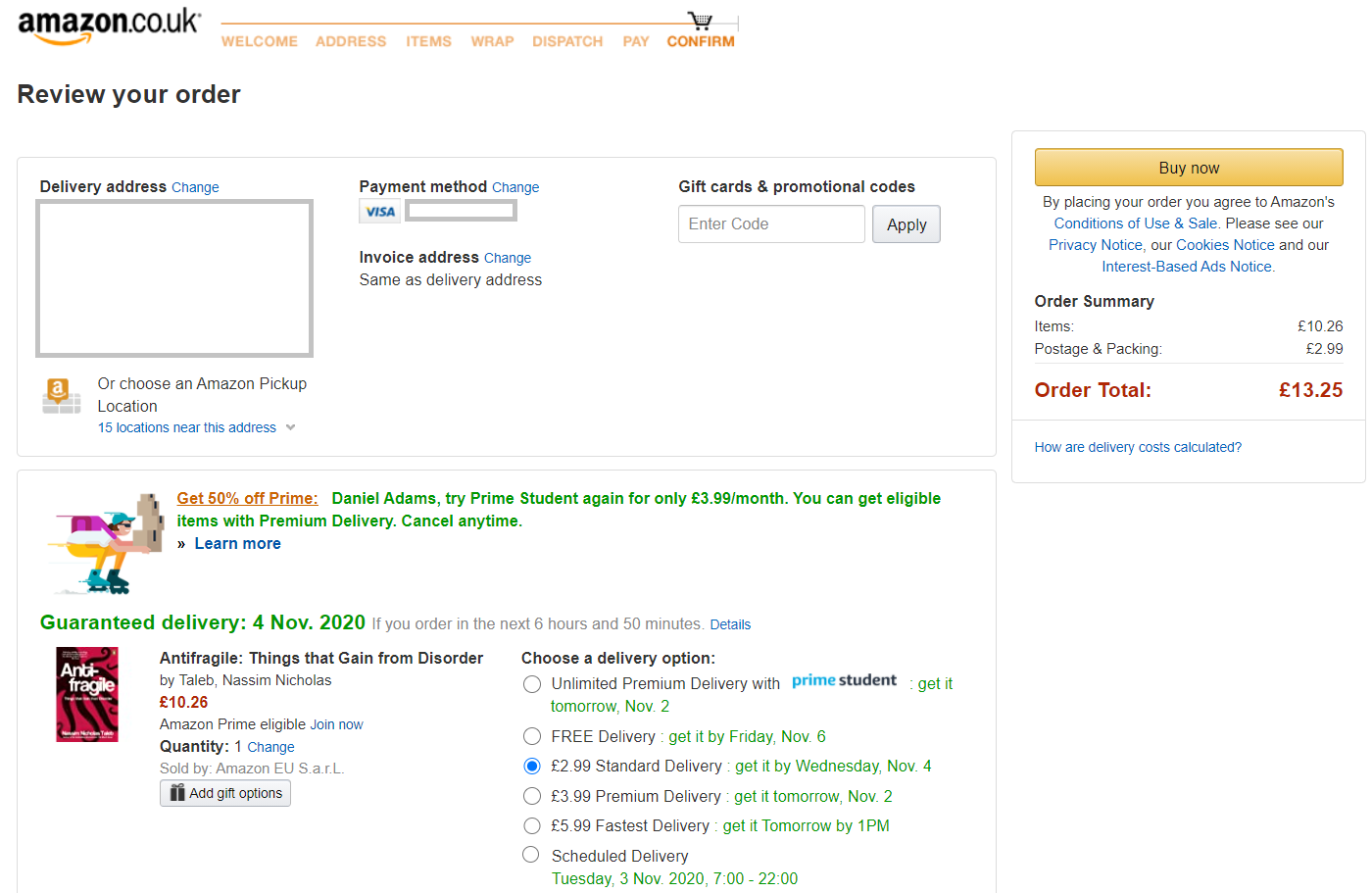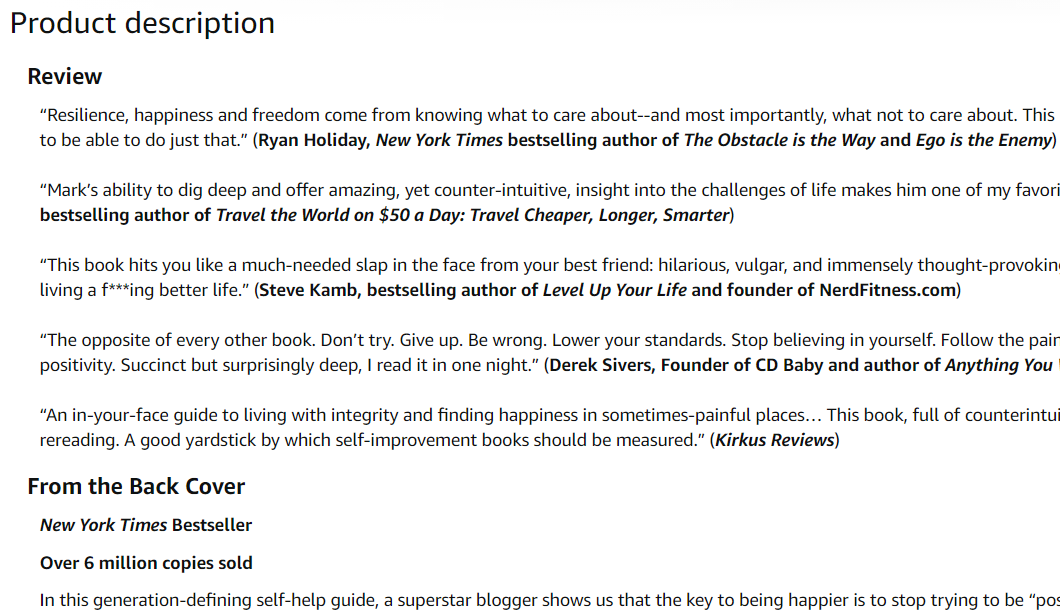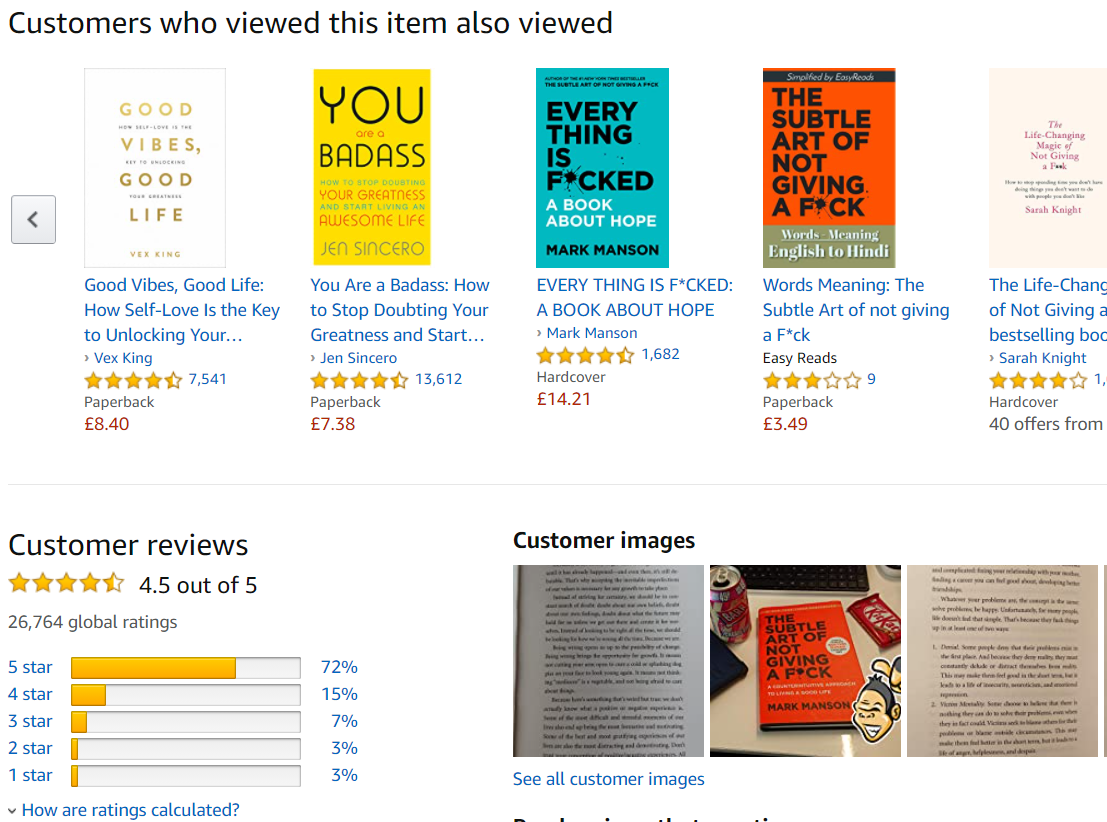Influence: The Psychology of Persuasive Web Design
-07 November 2020Intro
In 1984, Dr Robert Cialdini, a professor of psychology and marketing at Arizona state university, published "Influence: The Psychology of Persuasion". The book has sold over three million copies worldwide and has been translated into thirty different languages. It can be deemed the bible of marketing.

Dr Cialdini spent three years working and training undercover at used car dealerships, fund-raising organizations, and telemarketing firms to observe real-life situations of persuasion. He found that influence is based on six key principles:
- Liking
- Reciprocity
- Commitment and consistency
- Social proof
- Authority
- Scarcity
In this article, I introduce his principles of persuasion and apply them to web design. Persuading your users to take specific actions can be the difference between selling lots of your products or services, and selling none.
Liking
The liking principle can be summarised to: the more you like someone or want to like them, the more likely you are to be persuaded by them.
First let's discuss the main components that increase your likeability, and how Dr Cialdini defines them.
- Physical attractiveness. "Research has shown that we automatically assign to good-looking individuals such favourable traits as talent, kindness, honesty, and intelligence. We make these judgements without being aware that physical attractiveness plays a role in the process."
- Similarity. "We like people who are similar to us. This fact seems to hold true whether the similarity is in the area of opinions, personality traits, background, or life-style."
- Compliments. Joe Girard – "the world's greatest car salesman" – said his secret to success was getting people to like him. He sent a greetings card to each of his 13,000 former customers saying nothing but "I like you" and signing his name.
- Contact and cooperation. Consistently being in contact with someone and having a positive experience each time.
- Conditioning and association. "There is a natural human tendency to dislike a person who brings us unpleasant information, even when that person did not cause the bad news. The simple association with it is enough to stimulate dislike."
The consequences of liking are that good looking people receive significantly lighter prison sentences. We are more likely to help those that dress like us. Messengers in Ancient Persia that brought bad news were often slain.
Making people like you from your website
People dislike the "corporate" look these days. People want to see that they are interacting with real and relatable people who appear genuine.
Include an about page with a quality image of your friendly face. Take advantage of lighting, wear a colour that suits your skin tone, and style your hair (if you have any). The best looking politicians get the most votes, don't fight it, just work with it!

Also on your about page, tell your story in a relatable way. Who are your target clients? Are they rock and rollers or classical pianists? Mountain climbers or golfers? Astronauts or accountants?
Speak in their language e.g. accountants will be more formal than rock and rollers. Discuss your similar interests. What slang/lingo do they use?
Getting referrals and growing your business
People like their friends, so let their friends do your marketing. You could give your client three gift coupons that they can give to their friends. Each coupon gets you £80 off their first purchase from you.
How does this work so well? The client you give the gift coupons to will look good to his friends if he gives them a coupon worth £80, so he has an incentive to help you. The people that receive the coupon like and trust their friend who gave it to them, so they're likely to purchase a website from you.
You may be losing £80 per purchase, but if you keep in touch with these people through something like a weekly newsletter, where you're always providing value, they are likely to use your services again in the future. Having high customer lifetime value is where the real money is made!
Takeaway: Be genuine, personal and likeable! Take advantage of the four principles of likeability.
Reciprocity
We pay back what we receive from others. The reciprocity principle is essentially tit for tat.
Reciprocity is deeply rooted in all of us. We have evolved to reciprocate for hundreds of thousands of years. But why?
A simple evolutionary explanation is that it paid off during caveman times to play nicely and cooperate. It meant that someone could give up and share with you some of their woolly mammoth meat, and know that they would be covered by you if they didn't catch anything in the future.
Your strong feelings of indebtedness would force you to give up some of your meat to your fellow caveman in the future.
How can we take advantage of this during web design?
Say you click on a link to read a blog article, and the first thing they show you is a popup to sign up to their weekly newsletter. Why would you sign up when you don't know who they are, whether they produce good content, and they haven't yet provided you any value?
Give something to your user before you ask them to doing anything in return. Give them a great article that solves their problems. Give them useful information, entertain them and get them to know and like you.
Then ask them to sign up to your newsletter. The odds of them signing up will be higher if you've first given them something for free. It's a deep seated human desire to return the favour.
When making an app, don't begin by asking the user to fill in forms or read instructions. The app should be easy to use from the off with very little friction and cognitive load to get started. Once the user finds value in the app, then you could offer them the full paid version or additional features.
Also, don't ask for the users permission unless necessary. For example, if you have an app that involves voice recording, let the user explore your app before asking for permission to access their microphone. Perhaps ask them only when they press record.
Be an Educator, not a Seller
Pressure sales are now basically a thing of the past. Today, businesses take advantage of newsletters, articles, and social media content to provide information to prospects.
Rather than being hunters going out for the kill, they are farmers, nurturing prospects and gradually turning them into raving fan customers.
This not only takes advantage of the reciprocity principle, but also authority and liking. You provide them with valuable content (engage indebtedness), establish yourself as an expert (authority) and get them to like you by being genuine, honest and sharing your stories.
But when do you actually offer your product or service? For newsletters Alan Dib in his book "The One Page Marketing Plan" recommends three valuable, informative emails for every offer.
Takeaway: give something of value before expecting anything given to you.
Commitment and Consistency
Dr Cialdini defines commitment and consistency as "our nearly obsessive desire to be (and appear) consistent with what we have already done. Once we have made a choice or taken a stand, we will encounter personal and interpersonal pressures to behave consistently with that commitment. Those pressures will cause us to respond in ways that justify our earlier decisions."
This one lies deep within us, directing our actions with quiet power, often contrary to our own best interests. But why is this such a deep-seated weapon of social influence?
- Man will do anything to avoid the labour of thinking. Doing the same thing you did last time is often a good decision making heuristic. It saves time and mental energy.
- Social pressures. People respect people that are reliable and organized. Being erratic and inconsistent in your behaviour could lead to people labelling you mad.
Getting people to make a small commitment can change a person's self-image and therefore future behaviour. Commitments are most effective when they are active and public.
Applying it to your own business
Let's think about how we could apply this to your new web development freelancing business. We saw in the last chapter on reciprocity that we should offer our prospect something for free before we try to get them to buy any products or services from us.

Once we've educated them (blog posts, podcasts, YouTube videos), gave them value and earned some trust, then we can could ask them to make a small commitment: to sign up to our newsletter.
After a few weeks of value packed emails, we could offer to give them a free report on how a website could help their business. At this point, with sufficient trust, we could get them to commit to buying a website from us.
Providing you then did a good job, you could ask them to make a written public commitment testifying how great you are to work with and what a great job you do. You could then display this testament on your social media or website.
After a public written commitment like that, your client would find it very difficult to look elsewhere for their web development needs! They will feel strong internal and public pressure to remain consistent with their past commitments.
People hate thinking
Amazon takes good advantage of our cognitive laziness. Once you've finished packing your basket full of items and go to the checkout, if you're a returning customer, no forms are to be filled in and no thinking is required.
Your card details and delivery address are all there. They even make the amazon logo at the top left no longer clickable so you can't easily go back to the Amazon home page. The most obvious, effortless thing to now do is click the yellow "Buy now" button on the right (provided I resist the urge to get 50% off Amazon prime to get my book a couple of days sooner).
The user has already made a commitment by adding the items to the basket. Amazon makes it as easy as possible for them to behave consistently with that commitment.

Provide feedback
Perhaps you'd like your users to write a comment on your blog post or leave a review. Once they begin typing, a small message could appear that says "keep those fingers typing" – encouraging them to remain consistent with their commitment to begin typing.
Once they press submit, you could prompt them to make an account as that would be required to make the review public. It's unlikely they'd let their well thought through review go to waste as humans are inherently loss averse.
As you can imagine, this would work a lot better than asking them to sign-up to post a review before they wrote one!
Takeaways:
- The size of the commitment should be proportional to the level of trust you are at.
- Don't make the user think about stuff you want them to do. Do the thinking for them.
Social Proof
Let's begin with Dr Cialdini's definition of social proof: "we view a behaviour as more correct in a given situation to the degree that we see others performing it".
In other words, when we are uncertain we will look to see what others (friends, experts, celebrities, large groups) are doing before making a decision.
We want to copy celebrities to look good. We copy experts as we think they are more knowledgeable than us. We copy large groups because if lots of others are doing it, then maybe I should too?
Examples
Going back to amazon, I search for the book "The Subtle Art of Not Giving a F*ck". I click on the book and scroll down to find some positive reviews from "experts" – it must be good.
A little further down we see that there are over 6 million copies sold – wow, I simply HAVE to read this at some point!

Scrolling some more we find a "customers who viewed this item also viewed" section to encourage me to buy even more books. We then see 26,764 customer reviews with an average rating of 4.5 / 5. How can I not buy this book? Take my money Amazon!

It should be noted that if you're product has lots of negative reviews or has very few reviews or purchases, then showing these numbers could be detrimental.
Testimonials
Getting an expert or social media influencer to write you a short testimonial is a great way to demonstrate social proof.
If you're selling a product or service, for example you are a web developer making websites for sweet shops, a great way to get started is to offer a couple of sweet shops a free single page website in exchange for a testimonial.
Once you have a few good testimonials on your website, other sweet shops will be thinking "well, if they've got a website, and they're happy with it, then I should probably get one too. It is 2020 after all."

Takeaways:
- Get social media influencers, experts and customers to write about you or your product.
- Show your customers what other people are doing and thinking to encourage them to do what you want them to do.
Authority
This principle tells us that people follow the lead of credible, knowledgeable experts. People are brought up to respect and listen to authority – teachers, scientists, lawyers, engineers.
Dr Cialdini describes numerous examples of how displaying authority can be used to manipulate people into doing as you will. Here are a two:
- People were more willing to give change to a complete stranger for a parking meter when asked to do so by a person wearing a parking enforcer uniform than a person in normal clothes.
- One group of real estate agents increased their number of property appraisals by 20% by arranging their reception staff to first mention their colleague's credentials and expertise. "Lettings? Let me connect you with Sandra, who has over 15 years' experience letting properties in this area."
The importance of niching down
One of the huge benefits of niching down allows you to appear an expert in that specific area. By trying to appeal to everyone, you appeal to no one.
Amazon were solely an online bookstore before expanding into the giants they are today. Facebook started with students from one college campus.
Take a look at the photography industry. There are numerous niches such as:
- Family portraits
- Weddings
- Commercial
- Nature
If you and your partner become engaged and are planning a wedding, are you gonna go with the lady with no niche, who caters for all, or the lady with a website dedicated solely to wedding photography?
Same goes for web development. If you're starting out a freelance business, niche down. "Websites for coffee shops" or "Digital marketing for tennis coaches" are likely to fair better than "Fast websites for your business".
Master one niche before branching out to others.
How to influence your users with the authority principle
If you're making a website for an independent law firm, you could include an image of someone dressed as a lawyer, looking very professional.

If making a site for your web development business, talk about your relevant qualifications, perhaps you a have a technical degree. Discuss previous projects you've taken on and how you made a huge impact in that project using your expertise.
Associate with other well respected big names in your field and talk about them, or even better, get them to talk about you. This also takes advantage of the social proof principle too.
Also, if you or your client have worked with some big well-respected companies in the past, then you can include their logos on your site. You could include a section titled "Who uses ourwebsite.com" then put the logos beneath.
Takeaway: Take steps to appear an expert in your field to encourage people to listen to you.
Scarcity
"The way to love anything is to realize that it might be lost"
-- K. Chesterton
The scarcity principle is based on the fact that people are loss averse. People will be more likely to buy your product or take a specific action if you tell them what they have to lose if they don't, than what they have to gain if they do.
For example, a pamphlet that says "You can lose several potential health benefits by failing to spend only 5 minutes each month doing breast self-examination" got greater results than "You can gain several potential health benefits by spending only five minutes each month doing breast self-examination".
Scarcity in web design – this section will be unavailable in the near future, so don't miss out!

Limited time only.
Adding time limits can make people feel like they are going to miss out on something if they don't act now.
Many of you will be familiar with Udemy's ridiculously frequent (and shady) discounts on its courses. They put their courses up for way over-the-top prices like £100+ and then slash them down to around £15 for a week every month or so. Even though most of us know it's dodgy, it still works.
A way to utilise this technique could be to issue discount coupons to your past clients during holiday periods. Perhaps a 30% off coupon gifted to them for Christmas to show appreciation for their custom, available for a limited time only.
Exclusive offer.
Exclusive offers are ones offered only to a certain group of people, excluding "the others". It makes the offer seem rarer and more sought after, more elusive, and people want what they can't have.
Perhaps you could take advantage of this by sending out an email to past customers that you haven't heard from in a while.
Something along the lines of "We haven't heard from you in a while, and we like to look out for our past customers!" then give them an exclusive offer only for your older customers that you haven't heard from in a while. You could also take advantage of "limited time only" too!
You could also offer information and promotions exclusive to people that are part of your email sign-up to encourage them to sign up.
Takeaway: Make things appear rare, exclusive, and available for a limited time only to get people stirred up about missing out, and to take action.
Conclusion
These 6 principles of persuasion are not domain specific. They can be applied to any life scenario where you need to persuade. This could be job interviews, copy writing, or website design. They are fundamental and I believe that internalising these principles (weapons of influence) and figuring out how to apply them to your advantage would be hugely beneficial for the rest of your life. Just remember to use them for the greater good of mankind!


